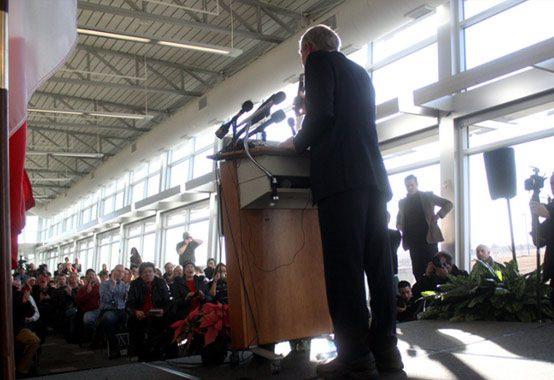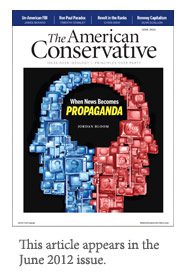Ballot of a Thin Man

Our daughter turned 18 this past winter, which meant, among other milestones, that in the April New York Republican primary she cast her first-ever vote. Being a girl of uncommonly good sense, she chose Ron Paul. She and my wife supplied the good doctor with 33 percent of his votes in our town. (As I remain a wholly torpid registrant of the slightly less bloodthirsty Democratic Party, and as the infinitesimal antiwar bloc of that party is harder to find than Chuck Berry at a meeting of Promise Keepers, I had no choice.)
Heretofore, all my adult life I’ve voted in those massive draw-the-curtain, pull-the-lever Myers Automatic Booths. (They were first used in 1892 in nearly Lockport, birthplace of Joyce Carol Oates and the supermodel-turned-hemorrhoid-cream spokeswoman Kim Alexis.) These were sturdy, solid, reliable. But the Help America Vote Act, signed into law by the wretched G.W. Bush—who with his wars and Patriot Acts and Wall Street bailouts and refusal to leave any child behind (or alone) is a contender for the most centralizing president in American history—forced New York to junk these estimable warhorses and use instead scannable sheets of the sort one associates with 1960s classroom overhead slide projectors.
We now vote in New York by filling in circles next to our choices in the manner of spiritless students answering multiple-choice questions on one of those standardized tests which Bush’s No Child Left Behind inflicted on the nation’s schoolchildren. Explain to me again why the Fortunate Son Romney, whose politics differ in no important sense from Fortunate Son Bush, is preferable to Obama?
Gretel’s first vote for a presidential candidate sure puts mine (for Ted Kennedy in the 1980 NY primary) to shame. It’s almost enough to make me believe in the improvement of the species.
This race is has been Ron Paul’s electoral valedictory. Whether he is the augury of a restored republic, as his yard signs proclaimed (he was the only candidate whose supporters declared him splendid in their grass), or a brilliant one-shot comet the fading of whose tail marks the end of liberty’s last chance in the erstwhile land of the free is a good test of one’s sanguinity. And as Brian Doherty emphasizes in his entertaining and incisive new book, Ron Paul’s Revolution, the Paul folks evince a sweet, even compelling optimism in the face of Empire. They savor of the old DIY—Do It Yourself—ethos of the circa 1980 punks, and in fact the Paul campaign’s grassroots call to mind the refreshingly rebellious idealism of those first punks.
Brian Doherty, not coincidentally, played bass for a 1980s Florida punk band called The Jeffersons. His 2007 book Radicals for Capitalism was a rollicking history of the libertarian movement full of I-Didn’t-Know-That moments. My favorite was the revelation that Leonard Read, pamphleteer for liberty and a founder of the Foundation for Economic Education, whom I had always considered a somewhat dull worthy, was a precocious experimenter with LSD who dropped acid the way an eight-year-old right fielder drops fly balls. I’ll never read “I, Pencil” in the same way again.
The portrait Doherty paints of Paul is of a soft-spoken man of peace patiently explaining the principles of liberty to those Americans—a minority as yet, alas—who are desperate for an alternative to those who sit atop our system: smug bullies and oleaginous operators whose only gods are war and power.
 Dr. Paul understands that despair is a sin, and anger a consuming fire. So he is equable but urgent, radical but in a meek-shall-inherit-the-earth way. He, more than anyone, has dented, if not shattered, the liberal-conservative/Red-Blue prison cell in which our politics are trapped, and American voices suffocated. Doherty describes the typical Paul crowd as consisting of “concerned veterans, pierced anarchists, conservative Christian moms, real estate brokers and homeschoolers and weapons enthusiasts and peace hippies” exuding “a galloping joy and enthusiasm.” And no great thing, as Emerson lectured us, is ever accomplished without enthusiasm.
Dr. Paul understands that despair is a sin, and anger a consuming fire. So he is equable but urgent, radical but in a meek-shall-inherit-the-earth way. He, more than anyone, has dented, if not shattered, the liberal-conservative/Red-Blue prison cell in which our politics are trapped, and American voices suffocated. Doherty describes the typical Paul crowd as consisting of “concerned veterans, pierced anarchists, conservative Christian moms, real estate brokers and homeschoolers and weapons enthusiasts and peace hippies” exuding “a galloping joy and enthusiasm.” And no great thing, as Emerson lectured us, is ever accomplished without enthusiasm.
My favorite Doherty snapshot is of Ron Paul sitting in an Ames, Iowa, hotel bar. He is not drinking, having declined Barry Goldwater Jr.’s sympathetic offer, “Do you need a tequila shot?”—but he is patiently discussing the Fourteenth Amendment with a 12-year-old fan.
This is the man who was booed by South Carolina Republicans—ostensible Christians—for advocating a foreign policy based on the Golden Rule. Sometimes, as the poet said, all you can do is sing about it. Or write about it. Maybe even read about it—and weep.
Comments